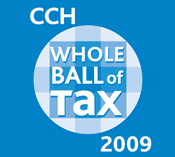| Home | About Us | Order Products | Press Center | Customer Service | Career Opportunities |

CCH can assist you with stories, including interviews with CCH subject experts.
Also, the 2009 CCH provides special CCH Tax Briefings on key topics at: CCHGroup.com/Legislation/Briefings.
|
It’s Back: If You Didn’t Qualify for the 2008 Rebate When Doing Your 2007 Tax Return, Now Is Your Last Chance(RIVERWOODS, ILL., January 2009) – Over the last year, millions of taxpayers have cashed their economic stimulus checks, but there are millions more who may be eligible for a new or additional payment, according to CCH, a Wolters Kluwer business and a leading provider of tax, accounting and audit information, software and services (CCHGroup.com). The recovery rebate credit is the result of the Economic Stimulus Act of 2008, signed into law in February 2008, and, technically, is a tax credit to be claimed on taxpayers’ 2008 income tax returns. However, to accelerate the economic stimulus effect, Congress authorized the IRS to send checks (the stimulus check) equal to the credit amount based on taxpayers’ 2007 income tax returns. Taxpayers will be required to reconcile the amount they received in their stimulus check with the actual amount of the recovery rebate credit they are entitled to claim using their 2008 income tax return. This will allow taxpayers who have had changes to their personal situation to either finally claim the refund or claim an additional amount. It also will allow taxpayers who have yet to file a return, a requirement to receive the recovery rebate credit, to finally get the money due to them. “In the last year, since the law went into effect, a lot has changed in many people’s lives that could now make them eligible for this money,” said CCH Senior Federal Tax Analyst John W. Roth, JD, LLM. “With the economy how it is, no one wants to turn down money they’re owed.” In general terms, the recovery rebate credit, which is a refundable credit, is the greater of the taxpayer’s tax liability up to $600 ($1,200 for joint filers) or $300 ($600 for joint filers) who have at least $3,000 of qualified income or at least $1 of tax liability and gross income in excess of the sum of the basic standard deduction plus the personal exemption amount (twice the exemption amount for joint filers). Qualifying income includes earned income, self-employed net earnings, Social Security and veterans’ benefits. If people qualify for the recovery rebate credit and they have a qualifying child or children, they can also receive a credit of $300 for each of the children claimed as dependents on their returns. According to Roth, specific reasons individuals may now qualify based on their 2008 tax information include:
One advantage of the rebate is it only gives; it does not take away. As a result, taxpayers with 2008 AGI exceeding the rebate limit, but who received the rebate earlier this year based on their 2007 tax return information, still get to keep the money. Claiming the RebateThe only way to receive a new or additional rebate amount is to claim it on a 2008 tax return – specifically on line 70 (Recovery Rebate Credit) of the IRS Form 1040. The IRS provides a two-page worksheet in the 1040 directions as well as a calculator on its web site to help taxpayers determine if and to what extent they are eligible to claim the rebate. Taxpayers not up for the math also can instruct the IRS to calculate the credit for them. To do this, they need to enter next to line 70 on Form 1040 the initials “RRC.” Additionally, if the taxpayer or spouse has received nontaxable veterans’ disability or death benefits, they need to also enter “VA” next to line 70; and “NCP” if they or their spouse had nontaxable combat pay, did not file Form 8812 and did not enter an amount related to the earned income credit (on line 64b). Receiving the RebateIndividuals claiming the rebate on their 2008 income tax return will not receive a separate rebate check as was the case last year. Rather, the rebate will be added to any refund they are owed or reduce any tax liability they owe. This will simplify the process for both the IRS and taxpayers, according to Roth. About CCH, a Wolters Kluwer businessCCH, a Wolters Kluwer business (CCHGroup.com) is a leading provider of tax, accounting and audit information, software and services. It has served tax, accounting and business professionals since 1913. Among its market-leading products are The ProSystem fx® Office, CorpSystem®, CCH® TeamMate, CCH® Tax Research NetWork™, Accounting Research Manager® and the U.S. Master Tax Guide®. CCH is based in Riverwoods, Ill. Wolters Kluwer is a leading global information services and publishing company. The company provides products and services globally for professionals in the health, tax, accounting, corporate, financial services, legal and regulatory sectors. Wolters Kluwer has annual revenues (2007) of €3.4 billion ($4.8 billion), maintains operations in over 33 countries across Europe, North America and Asia Pacific and employs approximately 19,500 people worldwide. Wolters Kluwer is headquartered in Amsterdam, the Netherlands. For more information, visit www.wolterskluwer.com. -- ### -- nb-09-08
|
© 2024, CCH INCORPORATED. All rights reserved. |
Back to Top | Print this Page | ||||||||||||||||||